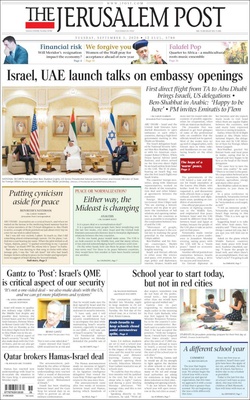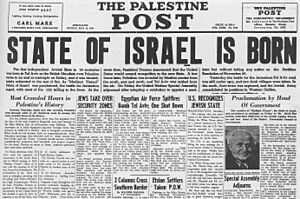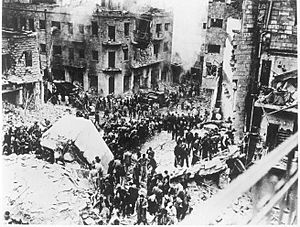The Jerusalem Post facts for kids

Front page of The Jerusalem Post; September 1, 2020
|
|
| Type | Daily newspaper |
|---|---|
| Format | Broadsheet |
| Owner(s) | The Jerusalem Post Group |
| Founded | 1 December 1932 (as The Palestine Post) |
| Political alignment |
|
| Language | English |
| Headquarters | Jerusalem |
| Country | Israel |
| Circulation | 90,000 (Weekends: 120,000) (International: 50,000) |
| Sister newspapers | Jerusalem Post Lite Maariv Walla! |
| ISSN | 0792-822X |
| OCLC number | 15700704 |
The Jerusalem Post is an English-language newspaper from Israel. It is based in Jerusalem and was started in 1932. Back then, Israel was called Mandatory Palestine, and the newspaper was known as The Palestine Post. In 1950, it changed its name to The Jerusalem Post.
The newspaper is published in English. It used to have a French version too. The Jerusalem Post sees itself as being in the political middle in Israel. This means it supports ideas that are a mix of traditional and modern views. It often speaks out against corruption in politics. It also believes that religion and government should be separate in Israel. The paper also supports more investment in Jewish communities around the world.
The newspaper comes out every day from Sunday to Friday. It does not publish on Jewish holidays or on Israel's Independence Day. It also doesn't come out on Saturday, which is the Jewish Sabbath. You can find articles about religion, world events, and money matters in its opinion sections.
Contents
History of the Newspaper
The first English newspaper in Jerusalem was The Jerusalem News in 1919. But this paper was not connected to The Jerusalem Post.
The Palestine Bulletin: 1925–1932
The Jerusalem Post actually started from a newspaper called The Palestine Bulletin. This paper began in January 1925. It was owned by a news agency called the Jewish Telegraphic Agency.
In November 1931, Gershon Agron, a Jewish journalist from the United States, became the editor. In March 1932, Agron decided to start his own newspaper. But instead, he and the owner of the Bulletin agreed to work together. They decided to turn the Bulletin into a new newspaper they would both own. So, The Palestine Bulletin published its last issue on November 30, 1932.
The Palestine Post: 1932–1950
The very next day, on December 1, 1932, the new newspaper appeared. It was called The Palestine Post. It supported the idea of a Jewish homeland in Palestine. It also spoke out against British rules that limited Jewish immigration during that time. Many people believed the newspaper was a good way to influence the British authorities.
1948 Bombing Incident
On February 1, 1948, a car filled with explosives was driven to the Jerusalem office of The Palestine Post. The bomb exploded, causing a lot of damage. Four people died in the bombing, including three newspaper employees. Many others were hurt, and the printing machines were destroyed. Even so, the newspaper still managed to print a smaller version the next morning at a nearby print shop.
The Jerusalem Post Today
From Labor to New Ownership: 1950–2004
In 1950, two years after the State of Israel was created, the newspaper changed its name to The Jerusalem Post. Until 1989, the paper generally supported the Israeli Labor Party.
In 1989, a company owned by Conrad Black bought the paper. After this, some journalists left and started a new magazine called The Jerusalem Report. The newspaper's political views also shifted more towards the right.
From 1999 to 2000, under editor David Makovsky, the paper took a more central view on defense. In 2002, Bret Stephens became the editor. Then, in 2004, David Horovitz took over and moved the paper back towards the political center.
Azur's Mirkaei Tikshoret Takes Over
On November 16, 2004, a company called Mirkaei Tikshoret Limited, owned by Eli Azur, bought The Jerusalem Post. Eli Azur also bought the newspaper Maariv in 2014.
In 2011, Steve Linde became the editor. He promised to provide fair news coverage and include different political views. Yaakov Katz then became editor in April 2016.
In January 2008, The Jerusalem Post started working with The Wall Street Journal. This included sharing marketing and publishing The Wall Street Journal Europe in Israel.
Since 2012, the newspaper has held a yearly conference in New York. Important people from the Israeli government and Jewish communities attend this event.
In 2020, another online newspaper reported that the Israeli Ministry of Strategic Affairs had paid The Jerusalem Post to publish articles against human rights groups. This included showing a film made by the ministry that tried to make the BDS movement look bad.
Also in 2020, news agencies reported that The Jerusalem Post and other news sites had published opinion articles written by people who didn't actually exist. These fake writers were used to publish articles that supported the UAE government.
In January 2022, hackers attacked The Jerusalem Post's website. The homepage was changed to show a threatening image. This attack happened on the second anniversary of the death of an Iranian general, and it was seen as a threat to Israel.
In March 2023, Avi Mayer became the editor-in-chief, replacing Yaakov Katz. Nine months later, Zvika Klein took over as editor.
In December 2023, during the Gaza war, The Jerusalem Post published an article that falsely claimed a dead baby from Gaza was a doll. The newspaper later removed the article and stated on X that it did not meet their standards. This shows how important it is for news to be accurate.
What the Jerusalem Post Offers
Influential People Lists
Since 2010, The Jerusalem Post has published a yearly list of the "50 most influential Jews" in the world. This list comes out around the Jewish New Year, Rosh Hashanah. In 2023, they also started a special event for these influential people.
Magazines and Publications
The Jerusalem Post also publishes a monthly magazine called IVRIT. This magazine is for people learning the Hebrew language. It uses special marks to help readers understand Hebrew words better. The Jerusalem Report is another magazine, published every two weeks, that covers news.
JPost.com: The Online Hub
JPost.com is the newspaper's website, launched in December 1996. It includes an online version of the daily newspaper and other magazines.
The website is run by a different team than the newspaper, even though they share reporters. The website team is based in Tel Aviv, while the newspaper offices are in Jerusalem.
The site has archives of articles going back to 1989. You can find short summaries of old articles for free, and buy the full articles if you want to read them.
JPost.com also has a "Premium Zone" where you can pay to access extra articles and special features. The website was updated in September 2014 and has special versions for phones and tablets.
Jerusalem Post Lite
The Jerusalem Post Lite is a weekly newspaper/magazine that helps people improve their English. It started on July 16, 2009. It's designed for people in Israel who want to learn English in their free time.
The Jerusalem Post Lite has 32 pages with different topics, from serious news to lighter articles. Each page has a dictionary that translates specific words into Hebrew and shows how to say them. Articles are ranked by difficulty with one, two, or three stars. The last pages have English exercises and crosswords. The content comes from The Jerusalem Post and other publications from the same group, as well as original material.
Editors of the Newspaper
- Gershon Agron (1932–1955)
- Ted Lurie (1955–1974)
- Lea Ben Dor (1974–1975)
- Ari Rath and Erwin Frenkel (1975–1989)
- N. David Gross (1990–1992)
- David Bar-Illan (1992–1996)
- Jeff Barak (1996–1999)
- David Makovsky (1999–2000)
- Carl Schrag (2000)
- Jeff Barak (2000–2002)
- Bret Stephens (2002–2004)
- David Horovitz (2004–2011)
- Steve Linde (2011–2016)
- Yaakov Katz (2016–2023)
- Avi Mayer (2023)
- Zvika Klein (2023-)
The Agron Family Connection
Gershon Agron started The Palestine Post and was its editor for many years. His nephew, Martin Agronsky, also worked as a reporter for a short time before becoming a famous American journalist.
Agron's son, Dani Agron, worked as the newspaper's business manager in the 1970s. Martin Agronsky's son, Jonathan Agronsky, also became a journalist in the United States.
See also
 In Spanish: The Jerusalem Post para niños
In Spanish: The Jerusalem Post para niños
- List of newspapers in Israel
 | Kyle Baker |
 | Joseph Yoakum |
 | Laura Wheeler Waring |
 | Henry Ossawa Tanner |



